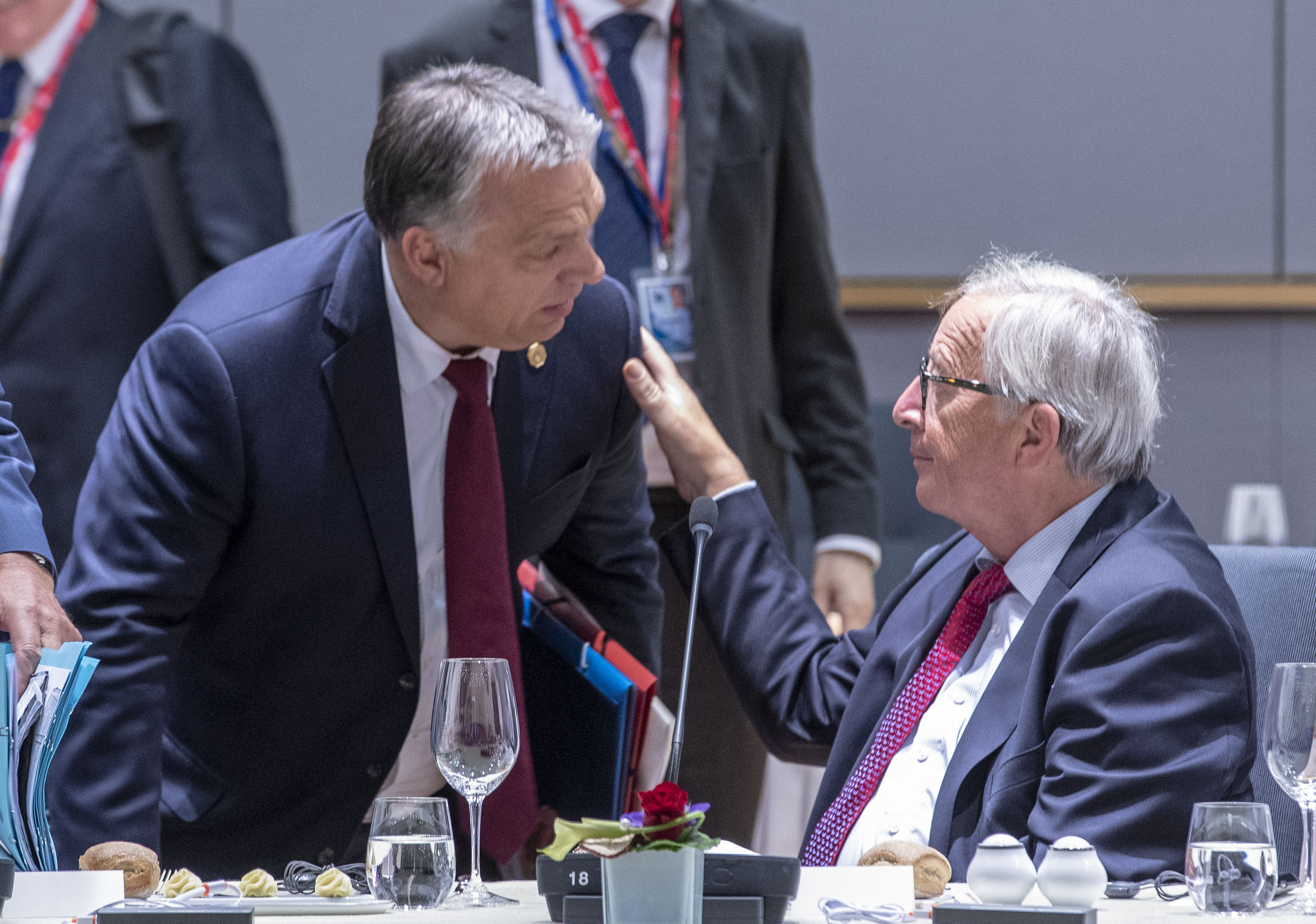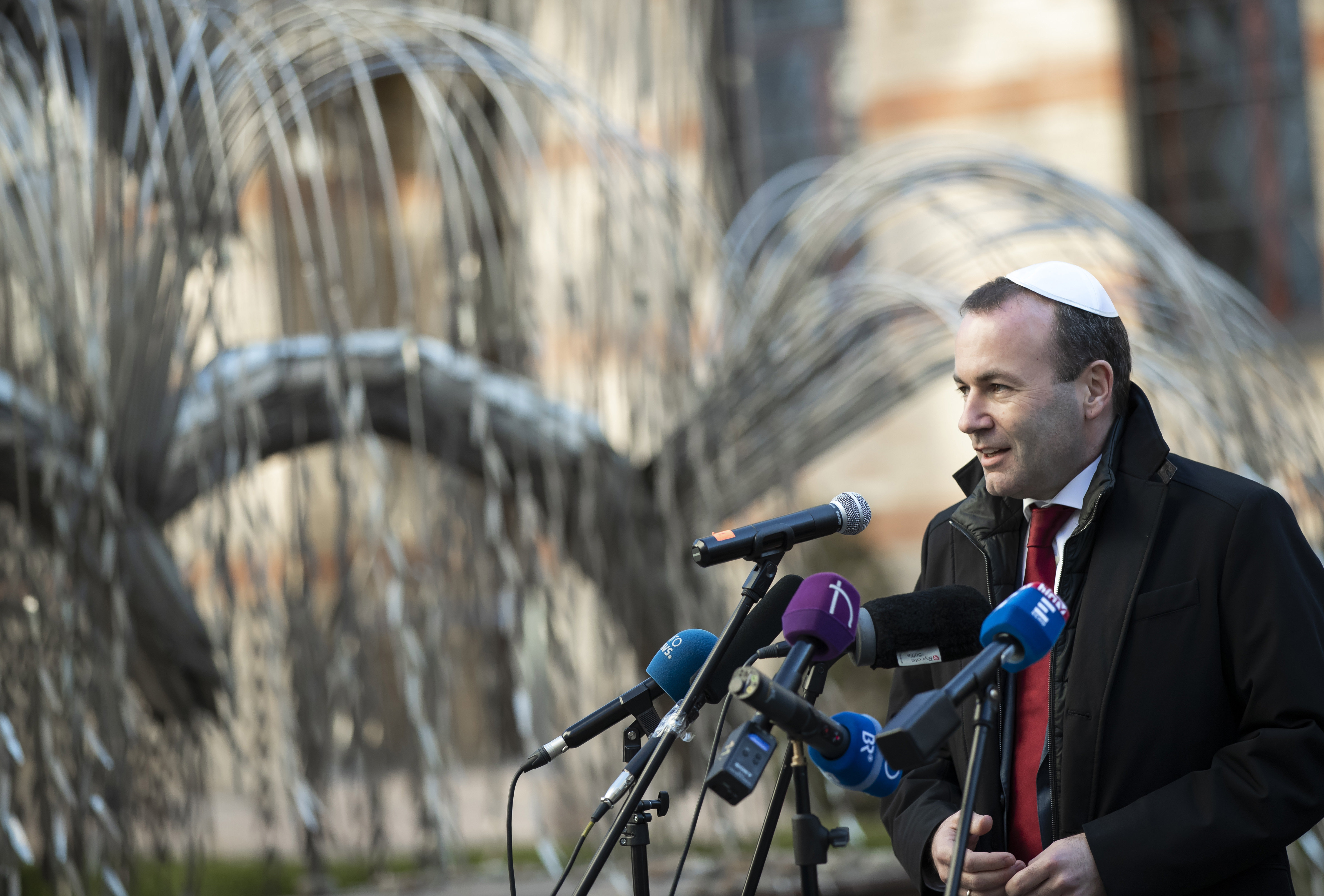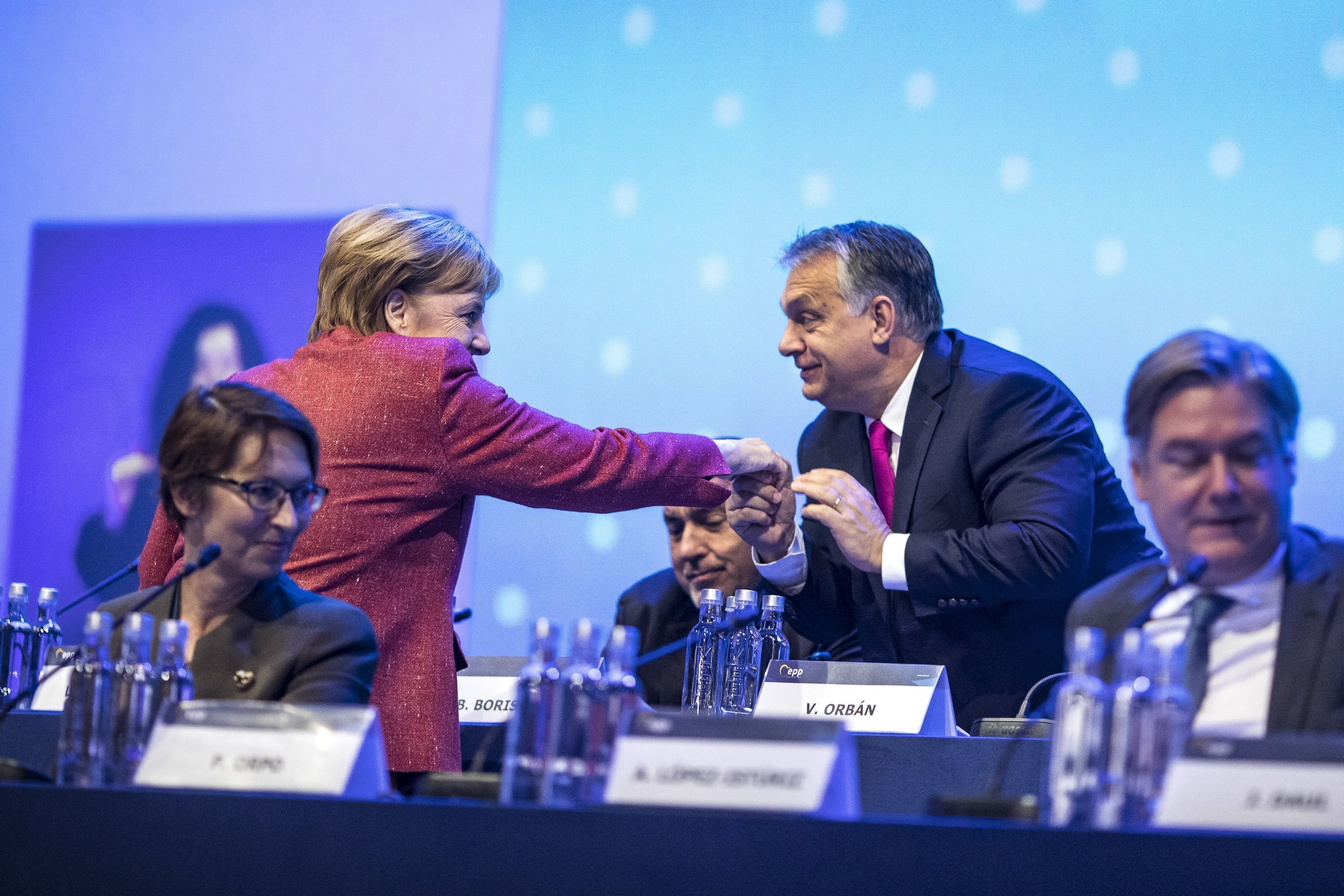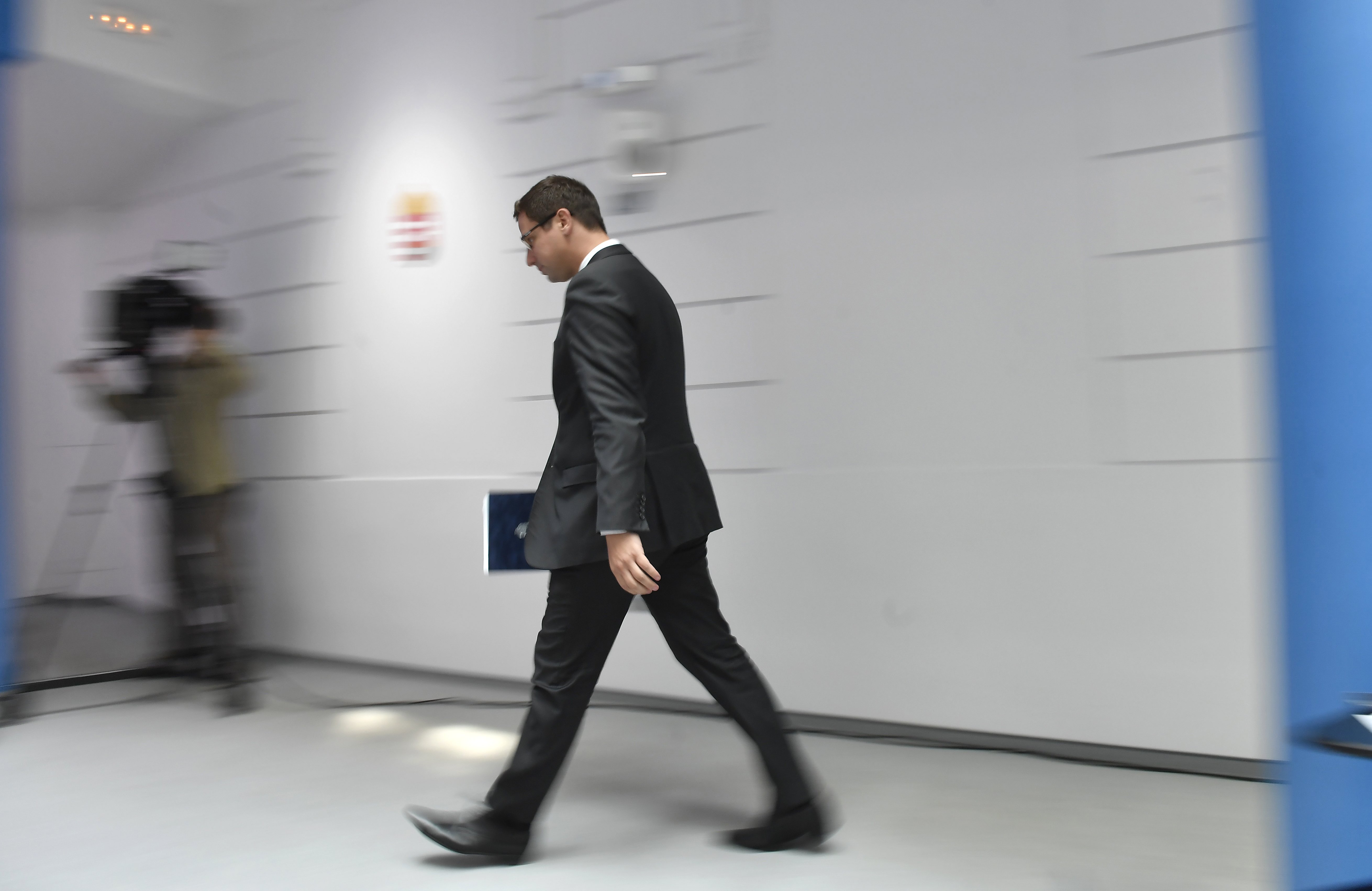
Is Viktor Orbán paving the way to power for Manfred Weber?

Many signs indicate that Manfred Weber's visit to Budapest Tuesday could serve as a spring board for securing the presidency of the European Commission in Brussels. And Viktor Orbán just helped him toward his goal.
It appears that Manfred Weber was able to arrange for CEU to remain in Budapest.
He will likely also ensure that the European People's Party does not break apart, that no party is kicked out of the group, and that no party leaves the group out of fear for the future of democracy.
For a long time in the west, Weber seemed to be a boring, feckless figure that was suspiciously open to right wing politics, and it was generally thought that he was a weak presidential candidate that was probably only there for Angela Merkel to eventually replace.
But if Weber and Orbán continue their public duel as they have until now, it could give the Bavarian politician a huge shove toward actually becoming the next president of the European Commission.
When the European People's Party (EPP) candidate for president of the European Commission Manfred Weber arrived in Budapest Tuesday, it seemed he had a pebble in his shoe in the shape of Viktor Orbán which so hobbled him that he would never reach his goal of being elected the next president of the Commission. By the time he left Hungary, his chances of acquiring the post had never been so good. In order to succeed, he must continue to cooperate smoothly with Viktor Orbán in the background while keeping up the public appearance that they are parties in dispute.
Weber's visit to Budapest Tuesday interrupted his European campaign tour. He'd come because 13 of the EPP's member organisations had demanded Fidesz's expulsion from the party, and a vote on the matter had been scheduled for March 20. Weber has only one vote of 260, but he is the party's leader in the European Parliament, and in November, he was elected as the party's nominee for president of the European Commission, to replace Jean-Claude Juncker. Thus, his opinion on Fidesz's expulsion counts for a lot.
The debate over Fidesz has become the most exciting topic so far in European press coverage of the EP election campaign; it is, thus far, the campaign's only international issue. Still, the publicity has not been favourable, neither to Weber nor to the EPP, because the narrative until now has been that the party doesn't know how to handle a half-fascist member organisation from the east that carries a lot of votes (Fidesz), and that Weber doesn't know what to do with Viktor Orbán. Once a great friend to Orbán, Weber laid down numerous “red lines” for him, and after Orbán overstepped them, Weber continued to speak about the importance of building bridges. A picture has emerged of Weber in the western media in which it is questioned whether he is a genuine candidate, and that perhaps he is only necessary so that German Chancellor Angela Merkel can easily replace him with someone else. Weber has nowhere near the significant career under his belt that previous presidents did: Juncker was prime minister of Luxembourg for 18 years, and for a long time was president of the Eurogroup. Barroso had been the prime minister and foreign minister of Portugal before being elected to the head of the commission. Weber's career is significantly more modest, an image reinforced by his campaign video in which he appears to be a simple Bavarian guy who had served for two years in the state parliament in Munich before being sent up to Brussels.
A recurring objection to Weber that comes up in analyses and discussions over his election chances is that he is a member of the CSU, and can therefore be placed on the right edge of the EPP: for years, he got along well with party's ultra-radicals, including Viktor Orbán, and is therefore unacceptable as a compromise candidate. This is also important because in order for him to win, he will need votes from socialists and liberals as well. Many consider it possible that the EPP will eventually replace Weber with France's Michel Barniertre, and that Angela Merkel would deliver another important EU position to a German politician, maybe Donald Tusk's job for herself, and Weber would be only an object for replacement within a larger bargain.
It seemed as though the debate over Fidesz had only weakened Weber's position within the EPP as well, because in a shared party, one must take a side even when it's certain to lead to the other side being injured.
A saviour?
Weber soon elevated himself to a main character in the debate surrounding Fidesz's expulsion by proposing three conditions that Orbán and Fidesz would need to fulfil to remain in the EPP. This was a clever communications move for several reasons:
With his offer, he suddenly appeared to be the one dictating the tempo both to Fidesz and to the initiators of its expulsion.
His conditions brought the debate into a formal framework, making it much more manageable than if it had continued along the more abstract concepts such as “the rule of law” and “the future of democracy”.
It gave Fidesz another chance by showing it what to do to survive in the EPP.
It was also a sign of strength, because among the three conditions, there was at least one which everyone agreed Orbán would never fulfil.
The three conditions were: that the poster campaign featuring pictures of Juncker and Soros should be ended; that Viktor Orbán must acknowledge that he has caused damaged to the EPP with his divisive behaviour (this was reported in the European press as a requirement that Orbán apologise, but it was expressed more carefully in its official wording); and that CEU must remain in Budapest.
This final point seemed the most unimaginable. After all, the government of the United States had already failed to save CEU, and failed to save several hundred world-famous scientists including many Nobel Prize winners. Manfred Weber himself had failed to save CEU when, last September, he offered to abstain from voting for the Sargentini report in exchange for the university being left alone. This proposition seemed completely hopeless, even more so than the prospect of Orbán murmuring some semblance of an apology.
Subscribe to InsightHungary, our English-language newsletter that is the authoritative source for what’s really happening in Hungary!
But it now seems that the matter of CEU really has been solved. In Budapest on Tuesday, Weber first announced that a Munich university and car maker BMW could contribute to CEU's maintenance. That's all he said, but it suggests a lot: if there are to be European entities sustaining CEU, then it will be considered an EU institution, and therefore Lex CEU will not apply to it. No one on the Hungarian side objected to the Germanification of CEU, and the university didn't reject it either. The press manager for the German university confirmed to HVG that “the new cooperation meets Hungarian legal requirements”.
It seems as if Weber, the bland politician from the Landtag in Munich, was able to solve what not even the American government could after two years of trying. And when the story breaks in the western media, the only photo from Budapest they'll be able to use is of Weber speaking between two rabbis in a synagogue. Weber held no other public events on Tuesday in Budapest.

After this, it will be hard to lament that Weber is too open to fascistoid ideas, and too right-wing to be a compromise candidate. Instead, the news will be that he is the only current politician that could get Orbán to retreat, the same Orbán that is perpetually described in western media as “anti-Semitic”. And Weber was able to do it all while wearing a kippah.
All signs suggest that Weber's conditions will be fulfilled, or at least that their fulfilment will enter such a phase that Fidesz will not be expelled on March 20. Some kind of delay tactics could come up (some ideas for this have already leaked), but total expulsion seems less and less likely. Fidesz promised to take down the Soros/Juncker posters, and the ones en route from the airport have indeed been taken down. The rest aren't really seen by foreigners anyway. Orbán will murmer some kind of apology for calling those that wanted Fidesz expelled “useful idiots”. It's true that this comment was made after the three conditions were announced, and that such an apology has nothing to do with why some wanted to expel Fidesz, but in form, it fulfils Weber's condition since it acknowledges that someone is causing damage to the EPP.
They adopted it, not invented it
It is unlikely that Manfred Weber developed his strategy for keeping CEU in Budapest just in the past few days. It's also unlikely that the option for Europeanising CEU (granting German diplomas) occurred to the university only now. In December, CEU announced that a good deal of its first year students beginning in 2019 would begin in Vienna, but the practical execution of the move is still, to our knowledge, progressing slowly.
It is also beginning to make sense why Fidesz members have been saying since December that CEU is not moving. Orbán said directly to an Austrian newspaper at the end of last year that “I know Soros, and he's not the kind of person that will leave Budapest just like that”.
Such a costly cooperation agreement would obviously have to be prepared in advance. Its announcement managed to be politically favourable for all involved parties:
Weber became the problem solver, someone who forged a kind of compromise that seemed unimaginable. Meanwhile, the most important virtue of the leader of an EU institution is the ability to forge compromises.
Orbán won't have to bow to the “trickiness of the Soros university”, but instead made it appear as though he would allow his “Bavarian friends” to spend a little of their money.
Through this shift, BMW, now contributing to CEU's financing, was able to become a supporter of Weber's campaign while not having to directly finance politics. Moreover, it is quite important to the entire German economy that the EC president have warm feelings toward auto makers.
This isn't finished yet
On the communicational and practical level the matter is not yet solved, so the above scenario cannot be considered certain, but it looks quite probable.
On Tuesday, the western media's attention was centred on the UK parliament's Brexit vote, and there is still no official word on CEU staying in Budapest. An announcement was made only on the German support. Nor is there any news that Weber has recognised that Fidesz complied with the three conditions to its remaining in the EPP. Officially, negotiations, investigations and coordination are still on the way. In order for Manfred Weber to sink into European public awareness as a builder of bridges until the election of the new commission president, this story needs to be spread out over time, in detailed instalments.
If things really do turn out this way, then Viktor Orbán will begin the 2019 EU cycle with an entirely new line-up than he started with in 2014. Five years ago, a commission president took power that was voted against by only two member state leaders: David Cameron and Viktor Orbán. If Weber manages to win the presidency, he will take power as a person which Viktor Orbán played the leading role in building up by playing the tamed lion.
Subscribe to InsightHungary, our English-language newsletter that is the authoritative source for what’s really happening in Hungary!


A Bild szerint a Néppárt vizsgálóbizottságot küldene Magyarországra

Kommentek
Közösségünk messze túlnyomó többségének jószándéka és minden moderációs igyekezetünk ellenére cikkeink alatt időről-időre a kollégáinkat durván sértő, bántó megjegyzések jelentek meg.
Hosszas mérlegelés és a lehetőségeink alapos vizsgálata után úgy döntöttünk, hogy a jövőben a közösségépítés más útjait támogatjuk, és a cikkek alatti kommentelés lehetőségét megszüntetjük. Közösség és Belső kör csomaggal rendelkező előfizetőinket továbbra is várjuk zárt Facebook csoportunkba, a Közértbe, ahol hozzászólhatnak a cikkeinkhez, és kérdezhetnek a szerzőinktől is.